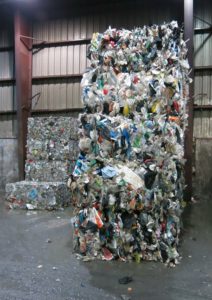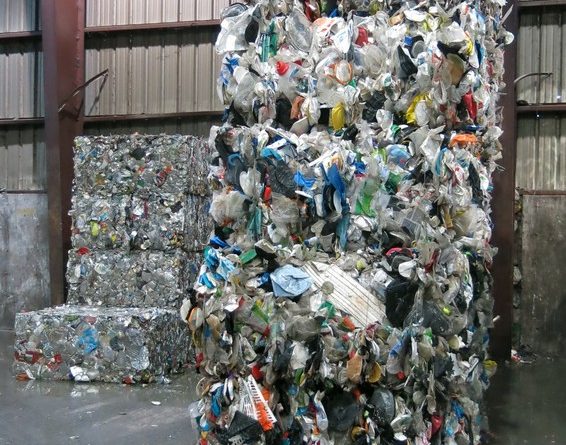We can do more to reduce plastic waste now!

Photo Larry Newman
Dodi Newman
Eric Schiller’s article in the December/January issue of IMAGE, “The plastification of the World,” made me think. For some time I have been concerned about the ever increasing amount of plastic waste that accumulates in my kitchen, from plastic shopping and storage bags to styrofoam and plastic wrap packaging for produce and meat, on to plastic containers for milk, juice, laundry soap and kitty litter, to mention just a few. All that stuff eventually has to be taken care of somehow. Shipping it elsewhere or dumping it into the nearest ocean was never a good idea for the planet.
Canada has sounded the alarm about plastic for some time. Catherine Mc- Kenna, Canada’s Minister of Environment and Climate Change, is reported to have said at a G7 meeting in Halifax last November, “We know plastic … is literally choking our lakes and rivers and we have to take steps to stop that or we’ll have more plastic pollution than fish by 2050.” Alas, we will wait a long time before the Canadian, provincial and municipal governments take meaningful, concrete steps to eliminate plastics or render them harmless for the environment, and, back in the kitchen, I decided to take action.
I abandoned plastic shopping bags a long time ago (remember cotton string, fabric or leather shopping bags?), and recently I stopped using plastic produce bags as well—at least new ones. I either re-use plastic bags that are left over from previous purchases, or I bring fabric or paper bags and pack my own produce. The latter has the advantage that I can inspect what I buy.
For years I have unthinkingly bought plastic storage bags for storing food in the fridge or freezer. By now I have largely replaced them with multi-use plastic containers or, better yet, glass canning jars. Their lids are not made of plastic, they are airtight and they freeze well. Needless to say, empty yogurt, cottage cheese or deli containers with lids, once washed, make excellent storage containers at no cost. Using pot lids or plates as covers for bowls that don’t have their own lids also saves on plastic. Instead of buying milk in plastic sacs or juice in plastic jugs, I buy liquids in glass bottles whenever possible or in cardboard cartons.
Ask the butcher to custom cut or grind what you want and to wrap it in paper; if a grocery store doesn’t have a butcher who is willing or able to cut or grind meat on the spot, there are stores that do. Middle Eastern stores often cut or grind meat to order on the spot. Here in Sandy Hill, Safi Fine Foods on Somerset provides that service—call first to discuss your order. Farm Boy and Produce Depot butchers will cut some meats to order. Loblaws and Metro will as well to a lesser extent. Butcher paper is usually coated with plastic to make it waterproof, but it’s a lot better than styrofoam trays wrapped in plastic.
And lastly, we can write or talk to store managers, chain store headquarters, and manufacturers to let them know that we object to the ever increasing plastic packaging, and that they should concentrate on eliminating plastics to the greatest extent possible. If enough people write or talk, they might even take action. Wouldn’t it be lovely if we had a store like Thornton Budgens in North London that, according to The Telegraph newspaper of November 7, 2018, has converted more than 1,700 product lines to non-plastic packaging over 10 weeks and hopes to be plastic-free in three years.
In addition to the ecological aspect of plastics there is the monetary one. All that stuff we are throwing away has material value. According to the Institute for European Environmental Policy, €72-108 billion (C$109-164 billion) of material value from plastic packaging alone is lost to the European economy each year. Unfortunately I was not able to find similar statistics for Canada, but piece for piece, our plastic waste is probably just as expensive as that of Europe. Talk about waste!
In addition to the material cost of plastic waste, consider the cost of creating, maintaining and expanding landfills, finding effective ways to deal with solid waste such as burning, and cleaning up the toxic side effects of storing or burning waste. For example, an “exposed interim geomembrane cap” was recently installed at Ottawa’s Trail Road Landfill at a cost of $5 million; that $5 million is just a small part of the Trail Road Landfill construction cost.
We—and food producers—have all known much of this for some time; yet landfills are overflowing and marine garbage patches, such as the Great Pacific Garbage Patch, keep growing in size and number. Yes, it will take more of your time and mine, it will not always be convenient, and it will cost a little more to avoid, or even to reduce, plastic waste. But think of the mountains of packaging that would not be thrown away in Ottawa alone if we all took that time. Isn’t it worth it?
Shoppers take note: Sometimes bringing home plastic bags is unavoidable. These neighbourhood stores do or do not accept plastic bags for recycling:
• Farm Boy does not, at any of its stores.
• Loblaws at 363 Rideau Street does (though some employees might tell you they don’t), so does its store at 100 McArthur.
• Metro at 235 Rideau Street does.
Bales of plastics recovered from blue boxes in Ottawa.
Photo Larry Newman
